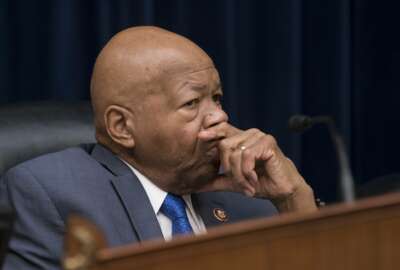
Government answers FAQs about feds attending conferences
In today's Federal Newscast, the Office of Government Policy clarifies what federal employees need to report when accepting invitations to attend conferences.
To listen to the Federal Newscast on your phone or mobile device, subscribe in PodcastOne or Apple Podcasts. The best listening experience on desktop can be found using Chrome, Firefox or Safari.
- Federal employees traveling to conferences now have some clarity about whether accepting registration fees is considered an in-kind payment. The Office of Governmentwide Policy issued new regulations stating it is not an in-kind payment if a federal employee receives a waived or discounted registration fee while participating as a speaker, panelist, or presenter. Therefore, the waived and discounted registration fees will not need to be reported to the Office of Government Ethics. However, other types of travel expenses paid by a non-federal source, such as transportation, lodging, meals, and attendance on non-speaking days must continue to be reviewed and reported to OGE. The new regulation becomes effective on Nov. 15. (Federal Register)
- The National Treasury Employees Union filed extensive comments to the Office of Personnel Management’s proposed rules on new disciplinary procedures. NTEU said OPM’s proposals incorrectly assume it’s too difficult to fire or discipline federal employees. The union said it’s astounded OPM is advocating against the use of progressive discipline and tables of penalties when dealing with poor employee performance or misconduct. The public comment period on OPM’s proposed rules closed earlier this week. (National Treasury Employees Union)
- A bill strengthening the independence of scientists at more than 20 different agencies is close to getting a full House vote. The House Science, Space, and Technology Committee approved the Scientific Integrity Act. Rep. Paul Tonko (D-N.Y.), the bill’s sponsor, said it aims to protect federal research from influence by political leadership which codifies scientific integrity guidelines at agencies. (Rep. Paul Tonko)
- Federal employees, members of Congress and good government groups are remembering the late House Oversight and Reform Committee Chairman Elijah Cummings. He died Thursday morning at age 68. NTEU called him a true champion for federal employees. The National Active and Retired Federal Employees Association remembered his leadership on the Thrift Savings Modernization Act and on postal reform. Rep. Carolyn Maloney (D-N.Y.) is expected to take over his chairmanship of the oversight committee. (Federal News Network)
- A new Senate report laid out what caused the Consumer Product Safety Commission’s data breach in April. Poor training of frontline employees and convoluted and ineffective systems were among the major causes of a CPSC data breach earlier this year. The Senate Committee on Commerce, Science, and Transportation released its findings Thursday after conducting an investigation into the cyber incident. The committee determined the breach was because of incompetence and mismanagement rather than deliberate, bad-faith efforts by senior managers or commissioners. In the April cyber incident, the agency exposed the personal data of more than 39,000 citizens and sensitive information of almost 11,000 manufacturers. The committee made three recommendations, including better employee training and to modernize the systems that CPSC uses to access and manage the data. (Senate Commerce, Science , and Transportation Committee)
- Air Force Materiel Command officially spent all the money it was allotted in 2019, nearly $67 billion, encompassing one third of the total Air Force budget. The command invested the money into multiple projects to support next-generation weapons and airborne testing for electromagnetic warfare. It also spent funds on building readiness and squadron innovation projects. (Air Force)
- The Senate has given President Donald Trump the green light to redirect military construction funds to build his promised border wall. Both Houses had passed legislation to overturn the emergency declaration that let the president raid the Defense Department accounts and defer projects on military bases. But Trump vetoed that measure, and on Thursday, the Senate fell short of the votes it needed to override that veto. Ten Republicans sided with Democrats on the veto override vote, but the chamber still fell well short of the two-thirds majority it needed. (Federal News Network)
- The Pentagon announces Chief Master Sgt. Ramon Colon-Lopez as the next senior enlisted adviser to the chairman of the Joint Chiefs of Staff. Colon-Lopez is the first airman to ever hold the position. He previously served as the senior enlisted adviser for U.S. Africa Command. Colon-Lopez took over the position from Army Command Sgt. Major John Troxell. (Department of Defense)
- Energy Department Secretary Rick Perry said he will be resigning by the end of the year. His long-rumored departure comes as he is under scrutiny over the role he played in the president’s dealings with Ukraine. He’s held the position since March 2017, making him one of the longest-serving members of Trump’s Cabinet. (Federal News Network)
Copyright © 2024 Federal News Network. All rights reserved. This website is not intended for users located within the European Economic Area.
Eric White
Eric White is news anchor and Federal Drive producer at Federal News Network.
Follow @FEDERALNEWSCAST
Related Stories
Related Topics
Air Force Materiel Command
All News
Consumer Product Safety Commission
data breaches
defense spending
Donald Trump
Elijah Cummings
Energy Department
Federal Drive
Federal Newscast
federal scientists
Management
military construction funds
Office of Government Ethics
Office of Personnel Management
Ramon Colon-Lopez
Rick Perry
Workforce
Workforce Rights/Governance





